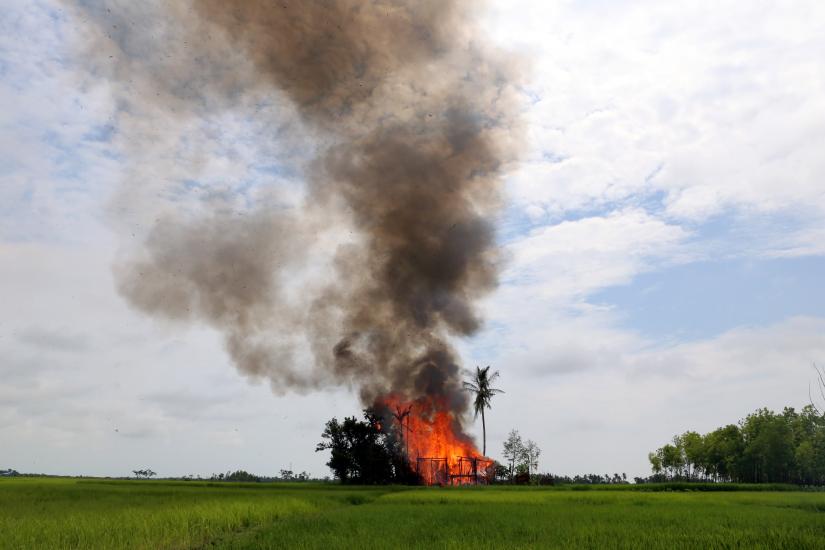 A UK firm that sold navigation technology to the Myanmar army is among the international companies being urged to review policies to counter the country’s anti-Rohingya actions.
A UK firm that sold navigation technology to the Myanmar army is among the international companies being urged to review policies to counter the country’s anti-Rohingya actions.
The Myanmar military, known as the Tatmadaw, is accused by the United Nations (UN) of carrying out a two-year reign of terror on the minority Muslim population, which has sought refuge in thousands across the border in Bangladesh.
Aberdeen-based Veripos is one of 59 international firms identified in a six-month study conducted by the UN, which concluded that money earned by the Myanmar military from international and domestic business deals substantially enhances its ability to carry out gross violations of human rights with impunity. The UN Independent International Fact-Finding Mission on Myanmar called on the international community to impose targeted sanctions and arms embargoes on the Myanmar military.
According to the mission, the military have carried out “extensive and systematic human rights violations” against civilians since 2016, including forcibly deporting more than 700,000 ethnic Rohingya to Bangladesh. During this period, they say, at least 14 foreign firms, from seven nations, supplied them with fighter jets, armoured combat vehicles, warships, missiles and missile launchers.
“We have to promote economic ties with non-Tatmadaw companies and businesses in Myanmar. This will foster the continued liberalisation and growth of Myanmar’s economy, including its natural resource sector, but in a manner that contributes to accountability, equity and transparency for its population,” said Marzuki Darusman, a lawyer, human rights campaigner and former Attorney-General of Indonesia who chaired the UN mission.
Foreign companies from countries such as China, Russia, Ukraine, North Korea, India, the Philippines and Israel came under scrutiny in the report, which found that at least 15 foreign firms have joint ventures with the military, while 44 others have some form of commercial ties with military-owned businesses. These foreign companies, says the report, risk contributing to, or being linked to, violations of international human rights and humanitarian law, and should conduct heightened due diligence to ensure they are not benefiting the Tatmadaw.
UK firm Veripos said in a statement: “Through an intermediary in Singapore, Veripos provided GPS products to the Myanmar Naval Hydrographic Center between 2014 and 2017 in compliance with applicable legislation and regulation.
“Our products are used for civil marine applications, eg hydrographic survey. Veripos remains committed to the highest standards of ethical behaviour and will abide by any regulations provided by the United Nations as a result of this report.”
The Fact-Finding Mission will present its final report to the UN Human Rights Council next month.
 International
International
39573 hour(s) 25 minute(s) ago ;
Afternoon 04:19 ; Tuesday ; Apr 22, 2025
UN report wants sanctions on anti-Rohingya Myanmar army
Send
Aditi Khanna, London
Published : 19:51, Aug 07, 2019 | Updated : 19:54, Aug 07, 2019
Published : 19:51, Aug 07, 2019 | Updated : 19:54, Aug 07, 2019
0 ...0 ...
/hb/
Topics: Top Stories
- KOICA donates medical supplies to BSMMU
- 5 more flights to take back British nationals to London
- Covid19: Rajarbagh, Mohammadpur worst affected
- Momen joins UN solidarity song over COVID-19 combat
- Covid-19: OIC to hold special meeting
- WFP begins food distribution in Cox’s Bazar
- WFP begins food distribution in Cox’s Bazar
- 290 return home to Australia
- Third charter flight for US citizens to return home
- Dhaka proposes to postpone D8 Summit
Unauthorized use of news, image, information, etc published by Bangla Tribune is punishable by copyright law. Appropriate legal steps will be taken by the management against any person or body that infringes those laws.
Bangla Tribune is one of the most revered online newspapers in Bangladesh, due to its reputation of neutral coverage and incisive analysis.
F R Tower, 8/C Panthapath, Shukrabad, Dhaka-1207 | Phone: 58151324; 58151326, Fax: 58151329 | Mob: 01730794527, 01730794528


